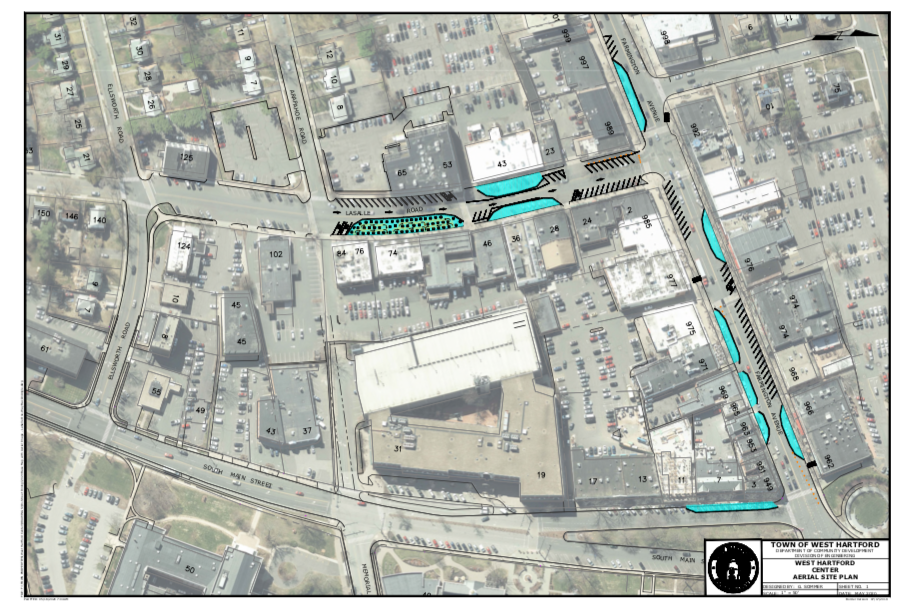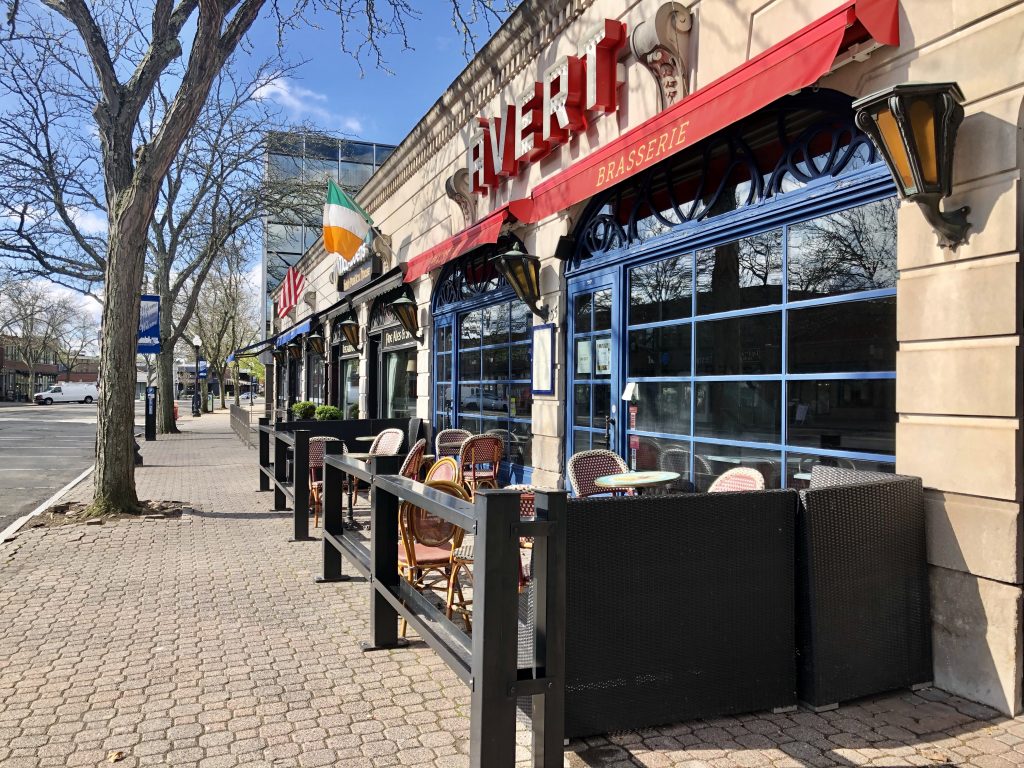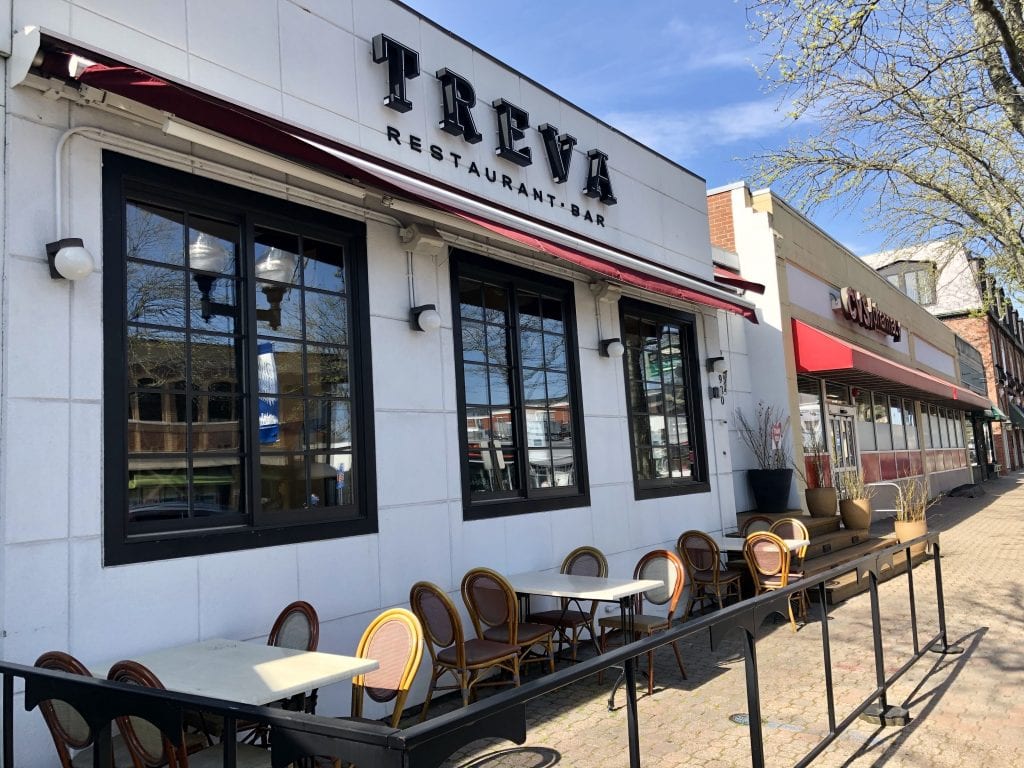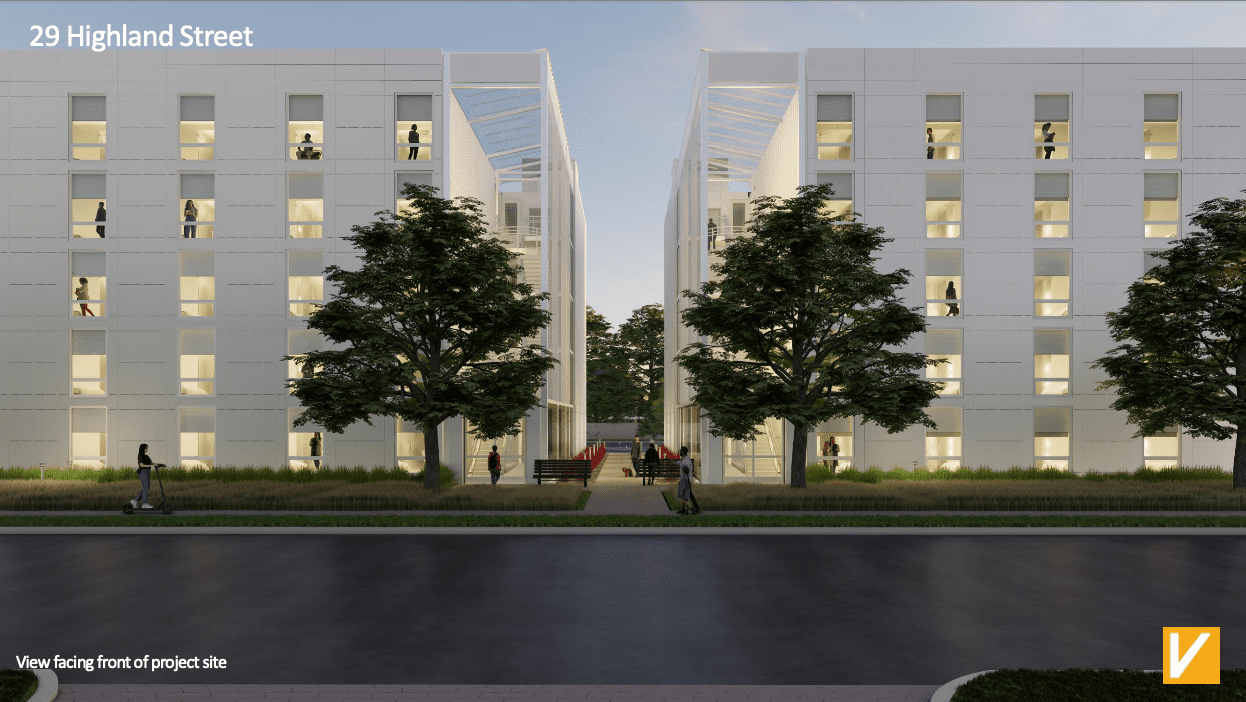West Hartford Mayor Establishes Special Advisory Committees, Council Receives Draft Outdoor Dining and Retail Plan

Audio By Carbonatix

A concept plan unveiled at Monday night's West Hartford Town Council meeting would bring significant changes to LaSalle Road to accommodate outdoor dining areas. Photo credit: Ronni Newton
A draft of an outdoor dining and retail concept for the Center was reviewed special virtual Town Council meeting Monday night, and Mayor Shari Cantor established an advisory committee to focus on economic and workforce recovery and another to focus on social and community recovery. [Updated]

A draft of expanded dining and retail in West Hartford Center includes major changes to LaSalle Road as well as use of parking spaces on Farmington Avenue and South Main Street. Full draft plan in PDF below.
By Ronni Newton
The West Hartford Town Council received a draft plan Monday night from town staff to accommodate the expansion of outdoor dining and retail in the Center, and also prepared to engage with businesses and residents in the community through two newly-established special advisory committees.
“These are unprecedented and difficult times, and I’ve been inspired by watching our community support each other, pull together, help each other, protect each other,” Mayor Shari Cantor said at the virtual special Town Council meeting. She said the two committees are being established to provide structure, to work alongside and support the efforts of town staff, and to “be a platform and a venue for listening to community members.”
The goals and membership of the two bipartisan committees were outlined by Cantor:
- The Special Advisory Committee on Economic and Workforce Recovery “will be responsible for evaluating the needs of West Hartford’s businesses, nonprofits, and workforce as a result of the pandemic of COVID-19, and will make recommendations focused on reopening the town’s economy and allowing businesses and nonprofits to operate in a way that is healthy and safe.” It will be chaired by Deputy Mayor Leon Davidoff and members will include Minority Leader Lee Gold and Councilors Beth Kerrigan, Ben Wenograd, and Chris Williams.
- The Special Advisory Committee on Social and Community Recovery “will be responsible for evaluating quality of life issues, including social needs with regard to physical health, mental well-being, food security, childcare and education, quality of life matters, and more. It will also be responsible for joint deliberation with the Board of Education to consider needs of West Hartford’s school age populations.” The committee will be chaired by Councilor Liam Sweeney and include Councilors Carol Blanks and Mary Fay.
“It’s critical, not only for our community members to feel invested … but also to help us engage,” Cantor said of the committees, which will be tasked with listening and understanding, engaging the community in more robust ways, breaking down walls, and building opportunity.
“None of this is going to be easy, none of this will be set in stone,” Cantor said, acknowledging that mistakes will likely be made and that it’s important to understand that things are going to be fluid.
The work of the committees will begin immediately, facing several critical issues related to reopening and recovery.
The Special Advisory Committee on Social and Community Recovery will meet virtually on Wednesday, May 20, at 6 p.m., and will discuss with Leisure Services and Social Services staff plans regarding the most prudent timing for reopening of certain outdoor activities such as tennis and pickle ball, Town Manager Matt Hart said Monday.
That meeting will be broadcast on Facebook and comments can also be emailed to committee members Liam Sweeney ([email protected]), Mary Fay ([email protected]), and Carol Blanks ([email protected]).
They will also discuss the status of pools, camps, senior centers, libraries, other recreational facilities.
Hart apologized that notification of cancellation of certain camp programs was issued late last week without prior notification of the Council, and going forward those types of discussions will be held with the special advisory committees.
The Special Advisory Committee on Economic and Workforce Recovery will also be immediately engaged, as the first phase of reopening the state’s economy appears to be on track to begin May 20.
Indeed, shortly after the conclusion of the meeting, Gov. Ned Lamont issued Executive Order 7PP, which allows for the May 20 reopening of outdoor dining, offices, retail and malls, museums and zoos, and outdoor recreation businesses. The governor had announced earlier Monday that the reopening of hair salons and barbershops, originally included in the first phase, would be delayed until June 1.
A previous executive order, 7MM, gave municipalities permission to relax some zoning regulations and permitting to expand and promote outdoor dining and retail.
An interdisciplinary working group of West Hartford town staff has been at work for several weeks on plans in accordance with Executive Order 7MM that would provide restaurants and retailers with the ability to utilize public rights of way – portions of sidewalks, parking lots, and even parking spaces and roadways – to create more capacity.
“I want to commend the mayor for challenging us on this topic,” Hart said Monday. He said that long before COVID-19, Cantor, as well as several other Council members, have been passionate about increasing pedestrian accessibility in the Center and other parts of town.
Corporation Counsel Dallas Dodge summarized the timeline of executive orders which closed portions of the economy, and outlined the general rules involved with the first phase of reopening, of expanding outdoor dining and retail, but noted that because Executive Order 7PP had not yet been released prior to the meeting, he had not been able to review it.
Conceptual Plan

Outdoor dining will be expanded into the roadway on LaSalle Road under a concept plan unveiled at Monday night’s West Hartford Town Council meeting. Photo credit: Ronni Newton (we-ha.com file photo)
“How can we put more of the public right of way in play so our restaurants and our retailers can really maximize this opportunity?” Hart said.
The draft included incorporation of public property into space where restaurants and retailers can expand their operations. Restaurants that are purely on private property, such as those in Bishops Corner or Corbin’s Corner, will also be able to apply for a permit from the town to expand into common areas if they can get permission from their landlords.
“This is the model we want to take to our business community, our restaurant community, our retail community,” Hart said of the concept he presented for the Center. Stakeholders will be invited to engage with town staff Wednesday morning at 10 a.m., and Hart said there are plans to replicate the concept in Blue Back Square and perhaps in other parts of town as well, although it may pose more of a challenge in Elmwood and Park Road areas where alternatives to on-street parking are not as plentiful.
The concept for the Center includes making LaSalle Road one-way headed northbound between Arapahoe and Farmington Avenue, and eliminating about 43 parking spaces to significantly enhance restaurant seating capacity.
On the eastern side of LaSalle Road, the angled parking spaces (see PDF below) would be approached in a different way. “This plan calls for back-in parking which is not something we do in West Hartford right now but is becoming accepted around the country,” Hart said.
Dining areas – as much as 6,000 additional square feet – would be added on the eastern side of LaSalle near Bricco, Song, and Harvest, and another section would be added near Division West. On the western side, a dining area would replace parking spaces in front of Union Kitchen, McLadden’s, Ávert, and other establishments.

A stretch of Farmington Avenue in West Hartford Center near Treva could have outdoor dining extend into the roadway under a concept plan unveiled Monday night. Photo credit: Ronni Newton
The concept also calls for additional dining areas on portions of Farmington Avenue, such as near Zohara, Treva, bar taco, and Max’s Oyster Bar. It also contemplates turning parking spaces on South Main Street into a dining area near Blue Elephant Trail.
“Our intention here is a particular restaurant would take ownership of a particular portion of the right of way and that would be their responsibility,” Hart said.
The town has some tables that it could donate, and will be responsible for trash pick-up and maintenance outside of the perimeter of the dining areas, but otherwise the cost of maintaining the areas would fall to the restaurants.
Although diners will not be permitted to go inside the restaurant premises, the exception will be to use the restrooms, Hart said. Regulations for sanitation are outlined in the state’s plans, which also includes guidance about single-use or electronic menus, limiting the number of wait staff who interact with each table, and use of rolled or disposable silverware.
The cost to the town, Hart said, is estimated at roughly $163,000 which includes maintenance ($43,000), labor, including the need to have police reroute traffic ($14,000), and materials ($106,000). He said there is no need for the Council to appropriate extra funds because the surplus in the Public Works snow removal budget and savings due to a hiring freeze can be utilized.
Hart said that many restaurants will continue to extensively rely on take-out business, and those temporary dedicated parking areas will remain. In addition, “in an effort to promote business we’re not planning to charge near term for the on-street spaces,” Hart said.
The conceptual plan also includes several parking areas for bicycles.
Economic Development Specialist Kristen Gorski said that prior to development of the conceptual plan she had sent out a survey to 113 restaurants, and received responses from 44. In addition, town staff had conversations with about 15 restaurateurs. About 65 retailers were also surveyed, with 11 responding to the survey, and there were also conversations with property owners and managers and representatives of the town’s business districts.
The concept has not been unveiled to the businesses yet because staff wanted to share it with the Council first, Gorski said, but businesses will be invited Tuesday morning to Wednesday morning’s 10 a.m. roundtable.
The idea of completely closing off the northern section of LaSalle Road to traffic was given serious thought, Hart said, but determined not to be a viable solution at this time. “The main reason is we want to make sure that the retailers and other businesses are going to have ready access to their businesses, customers have ready access to their establishments,” he said, especially since take-out is going to continue to be an important part of restaurant operations.
Hart said the goal is to have a conceptual design that can be set up for entire season, including through the fall, and to strike the right balance, also allowing for access for emergency vehicles and access to the alleys behind businesses on the west side of LaSalle.
A concept for Blue Back Square was not discussed in detail Monday night.
“We were considering closing off a portion of Isham in its entirety. Isham is actually designed for that,” Hart said, but both Barnes & Noble and Crate & Barrel have asked to retain some parking areas at this time for curbside pickup. In addition, Hart said that Cheesecake Factory does not plan to open for outdoor dining until it can also have indoor dining, and that would leave only World of Beer needing to use a portion of the Isham roadway.
Hart said an alternative option for Blue Back, to perhaps include portions of Memorial Road, will be developed.
Assistant Police Chief Dan Coppinger said he reviewed the plans and the proposals are excellent. “Safety-wise we approve and the police department can support these proposals,” Coppinger said.
All businesses planning to reopen must first self-certify through the state’s Department of Economic and Community Development, and receive the Reopen CT badge.
Restaurants that plan to utilize their existing outdoor dining footprint do not need to apply for any additional permits.
For those businesses that require additional permits – for expanding into the rights of way, for canopies, or for adding outdoor dining or retail as an option, among other changes, a dedicated page is now available on the town’s website, Hart said, and is a one-stop shopping format from the applicant’s perspective. Applications will automatically be funneled to the health department for review if needed, as well as the building department, fire marshal, or public works.
There are no fees associated with outdoor dining or retail permits.
Cantor said that this plan involves a lot of moving parts. “There has been extraordinary thought that has gone into this and lot of thought and deliberation,” she said, and closing roads is more complex than anticipated.
“I think this looks like a very, very good compromise,” she said, adding that health and safety are number one, and she was pleased with the comments and enthusiasm from Coppinger.
“This is a fluid and rapidly developing situation,” Hart said, thanking staff for putting together in just a few weeks what would normally take months.
He commended Cantor for challenging everyone, and said that while it may take a little while to get the additional dining spaces opened up, and it will only happen if the restaurants also support it, the town is ready and willing to review permit applications for any businesses as soon as they receive their badges,
“There are many things that are happening that our community is going to benefit from in the long run,” Cantor said.
The special advisory committees and engagement with the business associations will provide for much more engagement than has been seen before, and she thanked staff for the “heavy lift.”
Proper physical distancing, and wearing of facemarks or cloth face coverings, will need to be an integral part of the reopening and recovery plan, and the community will need to step forward and show respect for each other.
“My face covering protects you, your face covering protects me. That’s how interconnected we all are,” Cantor said.
“Let’s bring west Hartford through this stronger than ever.”
Like what you see here? Click here to subscribe to We-Ha’s newsletter so you’ll always be in the know about what’s happening in West Hartford! Click the blue button below to become a supporter of We-Ha.com and our efforts to continue producing quality journalism.
 Loading...
Loading... 



[…] Once plans are finalized, restaurants or retailers will have to apply for a permit from the town. A response to the permit request will be required within 10 days. More information can be found here. […]
[…] leisure and social services activities at the first meeting of the Town Council’s newly-formed Special Advisory Committee for Social and Community Recovery. Town Councilor Liam Sweeney is chair of the committee, which also includes Councilors Mary Fay and […]
[…] many restaurants already have some patio space, the Town of West Hartford has unveiled a concept plan for expanding outdoor dining and retail capacity through use of rights of way and portions of parking areas and […]
[…] town’s website also has resources for businesses posted on its website, Cantor said, and is working to increase outdoor dining and retail space. Businesses can apply for expanded space […]
[…] According to state guidelines, a response from the town to the permit request will be required within 10 days. More information can be found here. […]
[…] The Town of West Hartford is in the process of finalizing a plan for retailers, as well as restaurants, to expand their outdoor operations onto public rights of way as well as certain parking areas and even portions of roadways. Permits for outdoor expansion will be required, and more information can be found here. […]
[…] including Public Works, Engineering, Police, and Zoning, spent several weeks developing a concept plan for expanded outdoor dining in West Hartford, and that plan was presented to the Town Co…. After soliciting feedback from restaurants and retailers, and the Town Council’s Special […]